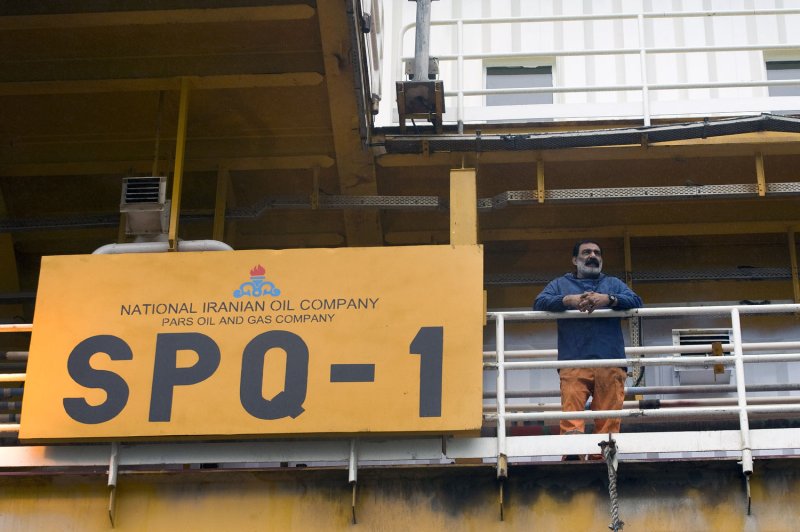Western energy companies could still work in the Iranian energy sector, but they need to have a high risk tolerance. File photo by Maryam Rahmanian/UPI |
License Photo
Oct. 18 (UPI) -- There are plenty of opportunities open in the Iranian energy sector for European countries provided they have a stomach for risk, an event organizer said.
Iranian energy companies were among the hundreds attending the annual Offshore Energy Exhibition & Conference, which wrapped up last week in Amsterdam. The Pars Oil and Gas Co., which helps drive operations at Iran's offshore South Pars natural gas field, was one of a handful of Iranian companies with a pavilion set up at the exhibition.
The Amsterdam conference concluded before U.S. President Donald Trump took a tougher line on Iran that could distance his administration from the multilateral nuclear deal from 2015 that brought sanctions relief to Iran in exchange for commitments to back off its nuclear ambitions.
Speaking this week, U.S. Treasury Undersecretary for Terrorism and Financial Intelligence Sigal Mandelker said that with the Islamic Revolutionary Guard Corps in the cross-hairs of the sanctions effort, energy could be a target.
"We have pointed out that the IRGC continues to be an integral part of the Iranian economy, including in the energy, construction, mining, and defense sectors," he said.
During last week's conference, companies from Tehran said they were set up to showcase the opportunities for international investors wanting to participate in Iran's offshore industries. Philip Mulder, the marketing manager for the exhibition, told UPI it was the second time Iran has been welcomed as an attendee. For Iran, there's the opportunity to gain access to new knowledge and technology needed to overhaul an energy sector burdened by sanctions. For European majors, they have the supply chain to do the job.
"In sum doing business with Iran is challenging, but there are plenty of business opportunities on the horizon," he said.
In July, a consortium of French energy company Total, China National Petroleum Corp. and Petropars Ltd., a subsidiary of the state-run National Iranian Oil Co., signed a 20-year contract to help develop parts of the giant South Pars natural gas field in the Persian Gulf, among the largest in the world. It was the first contract in the post-sanctions era for Iran and, after earning a second term in office, President Hassan Rouhani set a goal of signing 10 new development deals by the end of the Iranian calendar year, March 20.
In an August statement before parliament, the president said "banking transactions with the world are being carried out." And while remaining U.S. sanctions on Iran make it difficult to do business with the country, Mulder said European companies could still move forward so long as they avoid U.S. components in their work.
"Banking channels are still constricted [and] some European banks are slowly making transactions possible, but only if strict conditions are being met," he said.
Governors from the Central Bank of Iran met recently with representatives from the International Monetary Fund to discuss lingering capital issues.
Apart from the Total deal, energy companies from Russia and Thailand were among those signing preliminary agreements with Iran to examine the reserve potential for oil fields straddling the border with Iraq.
"Few companies are still hesitant," Mulder said.
From a production standpoint, Joe McMonigle, a senior energy analyst at Hedgeye Risk Management, told UPI that Iran has probably peaked in terms of what it can do by itself. Secondary sources reported to economists with the Organization of Petroleum Exporting Countries reported Iran produced 3.8 million barrel of oil per day last month, an 8.8 percent increase from the 2016 average.
In order for Iran to produce more, it will need support from Western investors, something McMongile said would be difficult given Trump's recent decertification.
"Even before Trump's move, many Western companies that are currently allowed to re-enter Iran after sanctions were lifted are hesitant due to concerns about U.S. sanctions," he said. "Now that risk is real."















